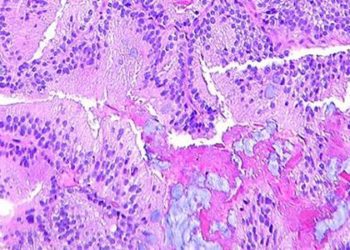Proton therapy associated with reduced toxicity and equivalent survival outcomes vs radiation therapy amongst patients with nonmetastatic nasopharygneal carcinoma
1. Intensity-modulated proton therapy was associated with fewer adverse events than intensity-modulated radiation therapy in the treatment of patients with nonmetastatic nasopharyngeal carcinoma.
2. Both therapies achieved equivalently good oncologic outcomes over a two year follow-up period.
Evidence Rating Level: 2 (Good)
Study Rundown: Nasopharyngeal carcinoma (NPC) is routinely treated with radiation and chemotherapy, although these modalities are often associated with serious adverse events. Proton-beam radiotherapy is a newer technology which focuses radiation to the tumor site, minimizing effects on surrounding tissue. Intensity-modulated proton therapy (IMPT) uses multiple energy beams to better localize radiation and has been shown to reduce treatment-related side effects in the management of other head and neck cancers compared to intensity-modulated radiation therapy (IMRT). This retrospective cohort study sought to evaluate the oncologic effectiveness and safety profile of IMPT and IMRT in the treatment of nonmetastatic NPC. 77 patients being offered curative therapy for nonmetastatic NPC at a single center were included between 2016 and 2019. 36% of patients were treated with IMPT and 64% with IMRT. The median follow-up time was 30.3 months. In this time, there was no significant difference in overall survival or local-regional failure rates between the two groups. With respect to safety, 68% of patients in the IMPT group and 94% of patients in the IMRT group experienced adverse events rated Grade 2 or higher. These results demonstrate that, given its superior safety profile, IMPT may be a promising alternative to IMRT, which is the current gold standard of care, for the treatment of nonmetastatic NPC. The study provides support for expanding the role of IMPT for the safe treatment of head and neck cancers. Li et al’s study is primarily limited by its retrospective nature and relatively short follow-up time. This is particularly problematic as radiotherapy has been shown to cause significantly delayed adverse events. There were also some differences in baseline cancer and treatment-related characteristics between the two groups (see In Depth). A randomized controlled trial with several years of data may be appropriate to further substantiate the results described in this study.
Click to read the study in JAMA Network Open
Click to read an accompanying editorial in JAMA Network Open
Relevant reading: Past, present and future of proton therapy for head and neck cancer
In depth [retrospective cohort study]: Patients with a new diagnosis of NPC at a single center were retrospectively reviewed for eligibility. Patients were offered either IMPT or IMRT alone for stage I cancer, or with cisplatin chemotherapy for stage II to IVa disease. Data collection was completed manually by two reviewers from the center’s electronic medical record using a standardized form. More patients in the IMPT group than the IMRT group had human papilloma virus-related HNC (14% vs. 2%, p = 0.06), had T4 disease (29% vs. 12%, p = 0.14) and received high-dose chemotherapy (57% vs. 24%, p = 0.004, statistically significant). IMPT was associated with lower rates of the following adverse events: dysphagia, fatigue, xerostomia, dysgeusia, oral mucositis, weight loss, hoarseness. On multivariable analysis, smoking history was the only factor found to be significantly associated with progression free survival (smoking vs. nonsmoking hazard ratio [HR] 6.33, 95% confidence interval [CI] 1.16-34.57). IMRT versus IMPT had no significant effect on overall survival (HR 2.29, 95% CI 0.36-14.67) or progression free survival (HR 0.80, 95% CI 0.28-2.68) on univariable analysis.
©2021 2 Minute Medicine, Inc. All rights reserved. No works may be reproduced without expressed written consent from 2 Minute Medicine, Inc. Inquire about licensing here. No article should be construed as medical advice and is not intended as such by the authors or by 2 Minute Medicine, Inc.









